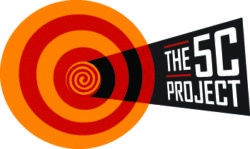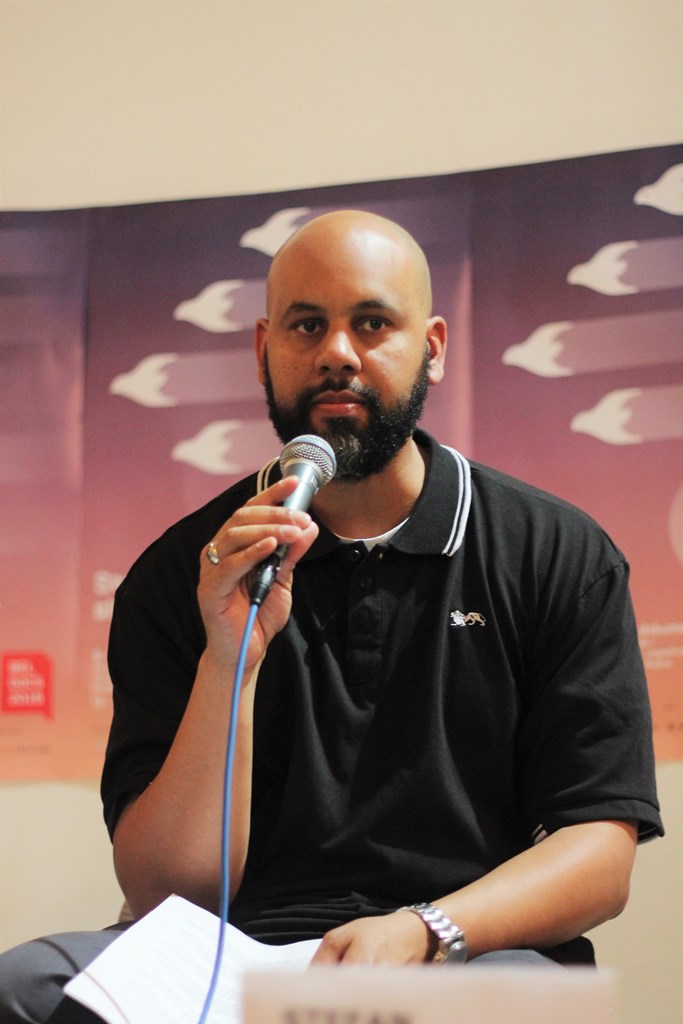In the break between the wonderful movies screened on Beldocs, I talked to Greg de Cuir – writer, translator, author and the artistic director of the festival. Greg gave an interesting insight in film festival culture, observations regarding documentaries, Balkan films in general and, of course, Beldocs.
What would you point out as the trademarks of this year’s edition of Beldocs?
Well, one of the things that we have this year is a number of premiers – a few international premieres, a few world premieres. We are trying to give our audiences a sort of privileged access to at least some films. I think there is a freshness and a new excitement in it. We also have more special programs at the festival, so we can have more of a thematic approach in some instances, but also a more historical approach. The two special programs that we have are the program on contemporary Bulgarian documentary, curated by Yoana Pavlova. I think it is a good way to highlight an under-celebrated national cinema. This is actually the first program dedicated to contemporary Bulgarian documentary outside Bulgaria. The second special program is a retrospective dedicated to Robert Flaherty, which this is the first attempt to do his complete retrospective in 35 mm in Europe. One of his films was discovered just two years ago and we have that film here as well. So, the idea with these special and competition programs was to give the audience something new, something exciting, something unique.
The festival slogan, “Really free”, is somehow opposed to many of the selected movies, which provoke the audience to think about the lack of freedom. Is the slogan meant to inspire the audience, give them a cinematic comfort or it has some other meanings?
I think we can look at the slogan in a number of ways. I should say I did not create the slogan, but I believe the slogan refers to the festival in and of itself, being free to choose the films we want to choose and not being pressured to fulfill any mandate. Being free means we were free of influence. The festival director, Mladen Vušurović, always welcomes creative ideas, so he encourages us to be free in our choices to do things differently. Also, the slogan refers to our audiences – we want them to be free to chose from this variety of programs. Hopefully, this sort of free, democratic spirit is at the heart of the festival.
How do you perceive documentary filmmaking in Serbia and other Balkan countries? Are the authors really free?
That’s a good question. We can always talk about being tied to your budget – how free are you in terms of how much money are you able to raise, or when you raise the money, how many interests do you have to serve, or does freedom come from the financial independence. Our Bulgarian guests talk about the same problems as our Serbian filmmakers. But yet and still, I think that directors are generally free if they free their minds and don’t feel that their work has to fit in a certain box or has to have a certain sort of cache in order to be “good documentary”. For example, Želimir Žilnik is a wonderful director. Now, his films are produced with a very modest budget. Yet, I couldn’t think of any director in the region or even Europe who is more free than he is, in terms of his aesthetics, his beliefs, his politics. That freedom obviously came from years of work and building his reputation. He has suffered, but at the same time, he is a strong fighter who fights for his art. He lives what he believes in. So, you’re free when you are in peace with yourself, when you do what you want to do. If you can look yourself in the mirror and be happy, you’re free.
What attracted you to the Serbian cinema and what do you find problematic in it?
I came to it through the film history. I found out about Žilnik, Makavejev, Branko Vučićević, Aleksandar Petrović, Živojin Pavlović, Lazar Stojanović, all the great ones. So, what attracted me was this golden age of Yugoslav and Serbian cinema, the films of the 60s and even the 70s, the films that were really unique, when there was a new generation trying out new ideas. After I came here and started my studies, I started looking more contemporary films. The thing that still attracts me is the fact that there are many young talented people here. I see a lot of directors making interesting films. I don’t always see them making their second or third film, which gets us back on the earlier discussed budget problems. So, that’s the bad side. If we could find a way to support young talents, hopefully we will do that through Beldocs with the market that we are going to establish next year and some other production-based things that we want to do to help domestic and regional production. This region does have a strong cinematographic spirit and really strong history of cinema, one of the best in Europe.
Do you think our documentary filmmaking is close to our current reality or is it dominantly focused on our past?
For some people, the way to talk about the present is through the past. Obviously, there were a lot of dramatic events in recent and past history, so that’s what people will always want to focus on and deal with. Yet, I believe the directors are doing a good job of looking at contemporary events. “Depth Two” is an interesting example of a film that talks about the recent past, but makes clear links to the present, asking what are we doing now to make our lives and other people’s lives better. Than there is “Abdul and Hamza”, which is very much engaged in not only what happens in Serbia, but the region, focusing on migrants and their struggles. Also, “Controindicazione”, which was filmed in Italy, is pretty much focused on what’s going on. I think a lot of directors here have a strong engagement with the society and that’s very promising for me to see.
What would you say about the documentaries in regular cinematic distribution?
Well, it’s hard. You don’t see much. Maybe some Oscar winners or maybe some Michael Moore documentary will get into distribution. That’s a wider problem regarding not just documentaries. When we talk about distribution and exhibition, usually it’s about Hollywood products, so even really interesting fiction films are having great troubles getting distributed and seen outside the film festivals. I think film festivals are sort of 21st century distribution model. That’s why we have so many festivals. Without the festivals, we would only be left with the Internet, and that’s difficult, because the Internet is so dispersed. Film festivals are still the place where people can gather and celebrate films together. I think this is the era of the film festivals and that’s a direct reflection of the lack of distribution opportunities in traditional models.
You are familiar with the concept of AltCineAction! online film festival. What do you think about online film festivals in general? Are they true game changers or just a trend? How practical are they?
Well, it is something in between. I don’t know if they are true game changers, and I don’t think that they are just sort of a fad or fashion. “Game changers” may be a little strong, because it is not much different from other online distribution models, whether they’re called a festival or not. I like them in the sense that it’s an interesting way to draw some attention around. At the same time, I worry, as, you know how things on the Internet go – it’s easy to leave things behind. You are bombarded with so many other things, your mail, your twitter… Online festivals need to be curated, there has to be a way to guide people through the content. It is hard to stay focused on one thing, and there’s a lot of competition, as there are so many other things that are also interesting, that are constantly beating at your door and begging you to pay attention.
Anything else you would like to add?
I think we are witnessing interesting time for the documentary and it always warms my heart when I can go to a documentary film festival and, you know, see five hundred or even more people in the audience for any given documentary. I still think that’s amazing and sort of a great sign of the state that the art form is in, a great sign that the audience is still in it, wanting something different, something beyond what they can get in a multiplex.

